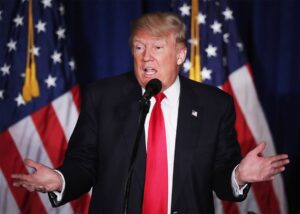by The Cowl Editor on September 28, 2017
Opinion

by Nicholas Moran ’19
Opinion Staff
Now that the dust has settled from President Trump’s chaotic United Nations address last week, confused onlookers have been trying to decipher what exactly is the president’s stance on foreign policy.
Was the president suggesting America should pull back from the globe and focus at home, heeding George Washington’s advice to not “entangle our peace and prosperity in the toils of” foreign wars? Or did the president aim to reassure the world that this nation is still a superpower, threatening tyrannical regimes like North Korea and Iran with our military might?
Several newspapers have suggested that Trump is deliberately trying to appear unstable, utilizing Nixon’s infamous “Madman Diplomacy” to frighten America’s enemies and prevent them from provoking the “madman” in the Oval Office.
In reality, President Trump has no clear foreign policy. Once again, the president has given a rambling and incoherent message to the world, full of empty rhetoric and contradictions aimed to appease everyone. Is America still a global superpower or should it put “America first”?
Parts of the president’s speech appeased the worries of Americans weary from wars in Afghanistan and Iraq. The Trump administration does “not seek to impose [America’s] way of life on anyone,” instead this nation shall “respect the interests… [and] the rights of every other sovereign nation.” Now the president “will always put America first… [and other leaders] should put their countries first,” putting an end to America’s global superpower status.
In fact, Trump blasted NATO for being a “one-sided deal where the United States gets nothing in return,” arguing that American involvement in foreign affairs is simply not worth it. Trump implied that making “the world safe for democracy,” as President Wilson famously exclaimed, is great for the world, but is ruinous for our own country.
Instead America should seek diplomacy in “de-escalating” the Syrian Civil War and de-nuclearizing North Korea, leaving our troops on the safety of our shores.
Seconds after Trump railed against past American policy, the president contradicted virtually everything he previously said, proving that his isolationist tirades were nothing but doublespeak. To appease citizens who believe the U.S. should wield its military might as a force for good, President Trump called on our “righteous… [allies] to confront the wicked… [and prevent] evil[‘s] triumph.”
Despots like Raul Castro in Cuba and the Venezuelan regime should tremble at America’s might, as Trump warned of “tough, calibrating sanctions” for ignoring the will of the U.S. Yet all of this directly contradicts his previous promise to respect the “sovereignty” of all nations.
Trump claimed he had been against the War in Iraq since 2003 but threatened to launch conflicts with several nations. For instance, the president promised to “totally destroy North Korea,” ending “rocket man’s… suicide mission” with force if necessary. Moving his sights to the Middle East, the president cried that the “murderous” and “corrupt” Iranians should “fear… the vast military power of the United States,” warning that diplomacy like the “failed” nuclear deal will not be enough.
According to Trump, We must destroy “evil” in Afghanistan, launch missile attacks in Syria, and America shall “crush loser terrorists” by denying “safe havens” in the Middle East. In a mere paragraph, Trump promised to escalate two existing wars and threatened three more.
As Trump moved to trade and foreign aid, once again the president relied on George Orwell’s concept of doublespeak. On the one hand, Trump promised to spend “billions and billions” to solve the refugee crisis, but in the same breath he denounced immigration for hurting “low-income citizens whose concerns are often ignored by both media and government.”
Unfortunately, Trump’s trade message was also unclear, as he promised to both “seek stronger ties of business and trade with all nations” and destroy trade deals like NAFTA that destroy “millions of jobs… factories… [and] our great middle class.” Should we support free trade or protectionism?
Ultimately, American voters deserve more than blatant contradictions and meaningless promises. Trying to appease everyone satisfies no one. What is your real foreign policy, Mr. President?